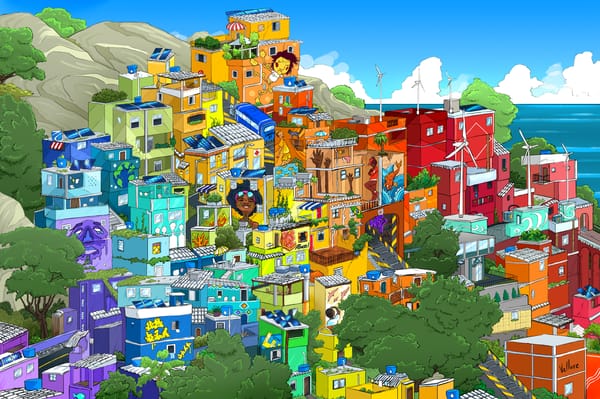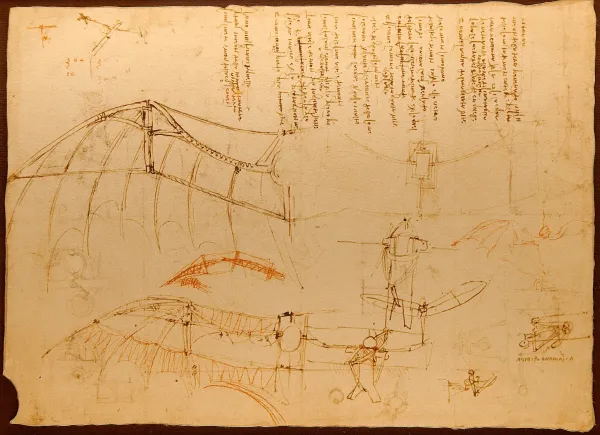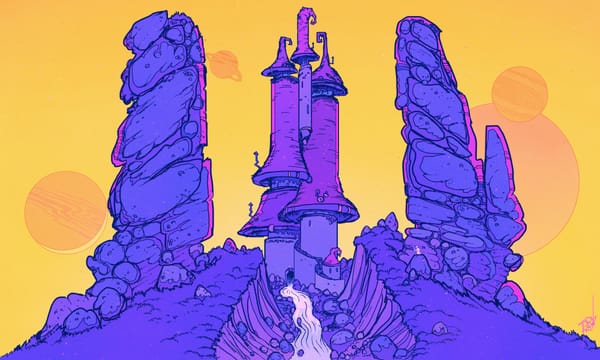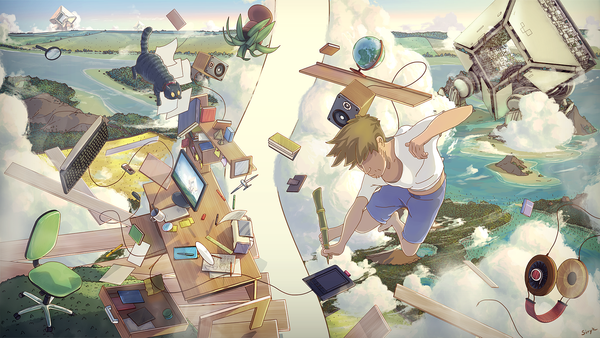Welcome to Muni Town
By now our community holds space for dozens of builders working on community tools in service of the Open Social Web. We call this expansive community space 'Muni Town'.

This used to be the blog for the Commune project. It will continue to be that and more.
Our work for the past years has branched out to multiple other ventures and partnerships, so we are reforming this space to embody multitudes.
By now our community holds space for dozens of builders working on community tools in service of the Open Social Web. We call this expansive community space 'Muni Town'.
In the old tongue muni has meanings like 'sage' and 'wise person'; we mean to make a digital town reigned by the wisdom of the crowd.
Origins
Where did this Muni thing come from? Or rather, what did it emerge out from?
Community OS
The rallying cry for Muni Town as a grassroots movement was a collaborative product vision named Community OS: Seize the means of communication!

An immense amount of work has already gone into the communications infrastructure of the world wide web. All the essential tech we need is already made. What’s missing is a coordinated effort to point our collective innovations in the same direction, towards digital emancipation as our final destination.
Central to the notion of a ‘Community OS‘ is an open web of people.

In the right hands – the hands of the netizens – yesteryear's technologies of social coordination remain as revolutionary as ever. We just never got to experience these tools as magical extensions of humanity.
In the current paradigm, the social media platforms strictly use and abuse your attention to amass centralized power and deepen their moats.
Reclaim your agency
How? By opening it all up: APIs, clients, protocols and algorithms.
Commune/Roomy Chat
Our first serious project, which materialized alongside the 'Community OS' vision, was the discussion app Commune:

Information into Knowledge
It bears repeating: Communications software is critical infrastructure. In the absence of communication, conflict resolution becomes either stagnant or outright violent.
Messages are transfers of thought. One mind's idea transmitted to another, through whichever medium of transport is best suited for the job. We share our inner thoughts with external peers to construct a shared reality. How we collectively view the world is downstream of our individual ability to convey our personal experiences.
Our collective power and agency in this world is only as strong as our freedom for individual expression; our capacity for pro-social change can be measured in how freely we may exchange messages with one another.
The project is now most actively developed as Roomy, a spiritual successor of the Commune vision, continuing the ‘message gardening’ paradigm:

Weird
Our second project was the ‘social network of websites’, Weird.

finally I’ll have my ultimate calling-card and place to call home on the interwebs.
Websites as the atomic matter of the internet
I consider the personal website to be the smallest possible building block of web identity.
Once you wanna go past the observer (READ) level to the contributor (WRITE) level as a netizen, you’re gonna need a material web-persona to make yourself known.
Connecting on the internet shouldn’t involve having to make constant compromises about which app-platforms to meet ‘the others’ on.
Where you meet up should be entirely separated from who you meet up as.

If video is more your thing, Weird (and the beginnings of Muni) is explained in 25 mins here:
Leaf
Out of the weird emerged a tiny web protocol.
Recently while working on a data model for Weird, I’ve started thinking about using an Entity-Component model to create a “web of data” instead of the “web of documents/pages/HTML” that we have today.

Leaf enables an Agentic Web.
The word agentic occurs primarily in the social sciences, pertaining to an individual's agency, often used interchangeably with autonomy or self-determination.
In social science, agency is the capacity of individuals to have the power and resources to fulfill their potential.
To be agentic is to be agent-centric. An agentic system optimizes for agency in its users, for example by measuring user agency as a metric of system performance.
An agentic web is..
- A web of agents; agent-centric, as opposed to server-centric.
- Local-first; solve local problems for local people.
- Accessible by default; inaccessibility is a bug.
- Systematically consensual; architected on the basis of informed consent.
Agency is the through-line for every Muni-aligned project; it’s at the center of our shared contemplative practice.
- where are the levers of agency?
- whose agency increases with this system change?
- is the individual’s agency weighed fairly against the collective’s agency?
Ownership & commercialization
The primary function of Muni today is as an incubator of social web projects - both commercial and non-profit - shared with and in the open commons.
Roomy and Weird are both commercial product ventures - developed at great expense and opportunity-cost to its makers - in hopes of enough return on that investment to make ongoing work on these products sustainable.
Equitable co-ownership is the long-term goal.
Ideal sustainability means a dozen people are working full-time to produce a best-in class product based entirely on open standards.
Leaf on the other hand is already a wholly commons-owned product. It’s currently being developed by a single lead developer (Zicklag) in collaboration with several peer advisors and the source code is licensed as ‘permissive open source’, so the code already belongs equally to everyone.
Most of the projects in the extended Muni network are licensed either permissively or copyleft, but some of them (like Weird) also experiment with source-available licensing along the lines of Fair Source practices.
We believe licensing innovation is a necessary part of healing the open source movement, by reintegrating its externalities. (A longer post on Weird’s licensing strategy is forthcoming.)
Muni incubates the commercial Roomy and Weird ventures, which in turn are incubating the non-commercial Leaf venture (which is a cornerstone of the Muni Commons) — see how that virtuous loop works?
Governance
For now, if we were gonna call anyone the "Major of Muni", that'd be me, Erlend Sogge Heggen.
A central part of Project Muni however is to decentralize my governing power to an ever-increasing number of Muni Town network leaders/advocates/residents until there’s no single inhabitant of Muni who holds a disproportionate amount of power.
Being a BDFL seems like such a chore.
I think I've already mitigated myself away as a central point of failure in the Muni Town working group - the show would go on without me - but in my immediate absence there would certainly be a vacuum of directional leadership, which I consider to be my main contribution (my job) in Project Muni right now.
Cohabitants

In our journey of making these apps and protocols, we’ve kept bumping into fellow travelers whose ambitions and values aligned enough with ours that we hitched our vehicles together for good company.
By now our merry little caravan is made up of a dozen projects and some 20-30 people in regular coordination. It’ll be a lot easier to keep track of us all once we land Teams & Projects support in Weird, but until then here’s a snapshot of our ragtag crew of alt-web protocol rebels:
- Erlend – Commune, Weird
- Zicklag – Weird (Leaf)
- Ahsanul – Commune (Matrix)
- Aumetra – Kitsune (ActivityPub)
- Seb – Rauthy (OIDC)
- Anders – LastLogin.io, TakingNames.io
- Flori – Polyproto
- Nova – Lantern
- Laurens — Fediverse Report
- Bumblefudge — Decentralized Identity
- Rudy — rsky (AT Protocol)
- Joep — Atomic Data (Solid)
- Niko — NextGraph (RDF)
- Iroh Team
- Willow Team
(this sample highlights project leads; many more active collaborators are not listed)
As should be clear from this list, rather than picking any specific protocol as the winner, we’re more interested in cross-protocol intermingling.
We surround ourselves with the greatest possible diversity of thought as an antidote to the ills of mono cultural thinking, and to keep things fun and interesting.
What started as a product-driven group chat has grown into an intersectional collective of considerable web-wisdom.
If you’re headed in our general direction, give us a shout if you wanna tether your vehicle-of-change to our loosely connected caravan of friendly change-makers 💞





